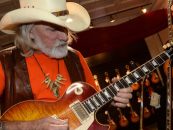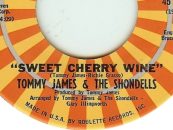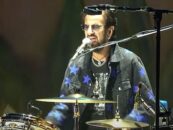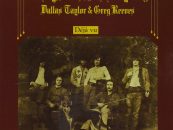
Mott the Hoople in 1974 (l. to r.): Dale Griffin, Ariel Bender, Morgan Fisher (front), Overend Watts, Ian Hunter (Photo from the band’s Wikipedia page)
Mott the Hoople arrived at CBS Records in the U.K., and Columbia in the U.S., in 1972 after four promising but unsuccessful albums on the Island Records label in the U.K. from 1969 to 1971. The lineup of those LPs—singer/pianist Ian Hunter, guitarist Mick Ralphs, bassist Overend Watts, organist Verden Allen and Buffin on drums—was helped by David Bowie, who supplied them with his composition “All the Young Dudes.”
The outfit then followed with the 1973 Mott LP. It’s the last album that included Ralphs and the first done without organist Allen. An edited version of “All the Way from Memphis” was issued as a single, receiving airplay on U.S. radio and reaching the U.K. singles charts.
When Ralphs then left to form Bad Company in late 1973, former Spooky Tooth guitarist Luther Grosvenor (renamed Ariel Bender) signed on for the album The Hoople. Bender then split to Widowmaker and Bowie refugee guitarist Mick Ronson joined the ranks.
This interview with Hunter, born June 3, 1939, was conducted in 1998. He released a solo album, Defiance Part 1, in 2023, with a follow-up arriving in 2024. Both feature an all-star cast.
Best Classic Bands: You still perform “All the Young Dudes.” Did you know the tune was strong when Bowie taught it to you?
Ian Hunter: Yeah, I knew it was a hit. We went up Regent Street and he sat on the floor in a publishing office with an acoustic guitar and he played it. Two things went down the back of my spine. Well, three things actually: First, a chill, second that it was a hit, and third I could do it.
Did the lyrics jump at you when you first heard them?
No, I just knew I could do it. David was coming from a different angle to me. I obviously knew what he was talkin’ about, but Mott had had a relatively miserable recording career. At that time, none of [the earlier albums] charted or anything like that. So, we were folding, and we knew radio wouldn’t play anything of ours unless it was classic. They had given us all the chances we were ever going to get. I knew it had to be “You Really Got Me” or something like that. That was what was in my mind. And all of a sudden this guy comes out of the woodwork. We’d split, and he wanted to put us back together and he said, “You gotta do this.” And we listened to it and he was right. “Why are you giving it to us?” Ronno [Mick Ronson] told me he had already tried it and it hadn’t worked out to his satisfaction. So, I guess when he saw us, with the keyboards and everything, he just thought we could do it. We could.
Did it always have the anthem-like quality to it, even when you first heard and learned it?
No, when we first did it, there’s a harmony that comes in halfway through the hook, and I knew we had it then. It was David’s idea. That to me was the killer. On “Dudes,” he said, “Be very English.” The only thing that was missing was that it kept going around on the end. He said, “I’m worried about it.” ’Cause we did it in two evenings. We did “One of the Boys” and “All the Young Dudes.” “Boys” was a B-side. At the end of the second evening, he was going off, “I think ‘Boys’ is the single.” I said, “You are out of your mind.” He said, “The back end of ‘Dudes’ is going ’round and ’round. Nothing is happening. There’s no, like, killer punch.” The talking part was my idea. And I just went out and added chat I had done at a gig a couple of nights prior at the Rainbow. I just repeated it, just for something to do, just to rev it up at the end. By the time we had finished it we were totally knocked out. David wrote a big hit for us. We helped him and he helped us.
What do you remember about your first exposure to American radio when you toured the U.S. in 1970?
First thing I thought was why they didn’t introduce each song. In England, they always introduced each song. Here you had about seven songs in a row and then they would say who did them. And by that time, I couldn’t figure out who I’d listened to. I found that difficult. They’d play seven straight songs in a row by, like, the Allman Brothers and all these other bands who all sounded a bit same to me, to be honest with you. At the end of it all they’d say who did ’em, and I’d forgotten which one they did. That was the first thing I noticed about radio over here. The second thing was there were a million different stations, which there was at the time. And we could visit a radio station for an hour and just chat. And it was any album track from any album from any band you wanted to hear. They would say, “What do you want to listen to?” And they would have it. So it was wide open in those days. Their libraries were huge. It’s changed an awful lot and for the worse.
The Mott The Hoople demo audition for Island Records talent scout, and future producer, Guy Stevens, has a segment of you singing Bob Dylan’s “Like a Rolling Stone,” collected in the Mott the Hoople boxed set. You eventually met Dylan.
It’s no secret that I’ve always acknowledged Bob Dylan as one of my heroes. Michael (Ronson) always liked to go to Reno Sweeney’s (a club in New York). One night I said to Mick, “Why don’t we go down to the Village?” I took him down to the Village. He’d never been there before. We went and all hell broke loose. Dylan was playing next door in a little café. Forty people in the room, and he performed what was to be the Desire album. It was great. There he was. What an electric night! Mick didn’t know what was going on. Bobby Neuwirth then got him the gig with the Rolling Thunder [Revue]. Dylan recognized me when Neuwirth told him who I was. We were introduced, and Dylan started jumping up and down saying, “Mott the Hoople. Mott the Hoople.” Here I was talking to Dylan, and I thought he didn’t like Mott the Hoople by the way he was acting. I didn’t need this shit mocking me. But then he turned round and said, “No, man, I dig Mott the Hoople! ‘Half Moon Bay.’ ‘Laugh At Me.’”
There’s a photograph of you and Dylan taken in New York in 1984 at the Whitney Museum celebrating the release of Dylan’s Biography boxed set. What does this photo trigger?
The first thing he did was go to the bar because he couldn’t handle all these people. The Band were there. Everybody in there I respected. Then the company people came, and he went to the bar and proceeded to get pissed. I can’t remember what I said to him that night. But the two artists I grew up with, Bob Dylan and the Stones (Mick Jagger) were both limited singers. But Jagger was the sexiest singer in the world, and Dylan would make your hair stand on the back of your head, because his voice was so lousy. That’s the truth. I’ve got a lousy voice, and so have Randy Newman and Leonard Cohen. But it doesn’t really matter. I’m conscious of not being a good singer, but that’s just in your throat. I think we all get the message across.
You’ve cited the band Mountain as one of your favorite groups. Explain your fascination with Mountain.
They were amazing. And I think they did their best to underrate it, actually. When you saw Mountain, it was one of the greatest rock bands ever. The organ player plays twiddly one-liners up against this enormous Leslie West [guitar] sound. And Leslie is a great player. I’ve seen him slip into Hendrix stuff and other stuff. I produced him at one point. He’s a great singer. I think what he misses is Felix [Pappalardi, bassist]. Those two used to be nose-to-nose and somehow Felix would translate. It was almost like Leslie was playing what Felix was thinking. Amazing band.
On your first tour of America in 1970, you got turned on to the debut LP of Delaney and Bonnie and Friends, and especially keyboardist Leon Russell.
Leon got a lot of flack from that tour and the Mad Dogs and Englishmen film because people kept saying he was trying to put [Joe] Cocker away. I don’t think Joe was that fit and healthy at that time and Leon was really doin’ the business, the piano playing.
What has always attracted you to the piano and organ combination?
When we started there weren’t any keyboards other than piano and organ. We didn’t have these little keyboards that now can do everything. And if you wanted piano and organ at the same time on a track, you couldn’t get a guy with his left hand on one keyboard and his right on another. You had to get a piano player and an organ player. So, then you had the piano and organ color. And then you had all the different guitar colors. It was also extremely powerful. Like “Ballad of Mott.” Some of those songs we would take ’em down to zero and all of a sudden bang, the whole lot would come in. It was easier to put dynamics in and drama, and beautiful, quiet stuff too. Sustaining stuff. Some things a guitar can’t do. It’s just a fraction too jagged. There’s a smoothness with a piano and an organ.
Watch Mott the Hoople perform “All the Way From Memphis” on The Midnight Special
Related: Our Album Rewind of All the Young Dudes






2 Comments so far
Jump into a conversationI love Hunter’s unexpected praise of Mountain. I agree with him. As great as they were, I believe they were underappreciated.
I luv reading stuff like this, especially from an artist I admired and whose songs I loved. Great reading all the back stories and how the performers related to each other.